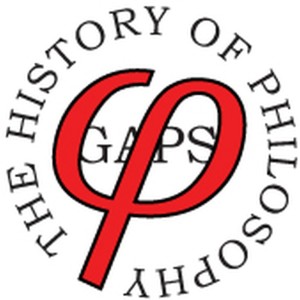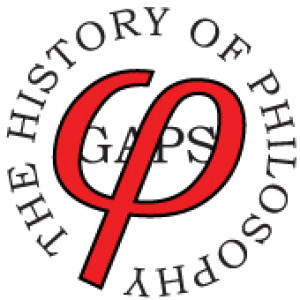Episodes

5 days ago
5 days ago
A royal scholar and philosopher sets aside the tribulations of her family to debate Descartes over the relation between mind and body and the nature of happiness.

Sunday Nov 24, 2024
HoP 457 - Take Your Medicine - Oliva Sabuco and Camilla Erculiani
Sunday Nov 24, 2024
Sunday Nov 24, 2024
Natural philosophy and medicine in the work of two unorthodox thinkers of the late sixteenth century, both of them women.

Sunday Apr 28, 2024
HoP 444 - The Dark Night Rises - Spanish Mysticism
Sunday Apr 28, 2024
Sunday Apr 28, 2024
Teresa of Ávila and John of the Cross push the boundaries of individual spirituality and offer philosophically informed accounts of mystical experience.

Sunday Oct 01, 2023
HoP 429 - She Uttereth Piercing Eloquence - Women’s Spiritual Literature
Sunday Oct 01, 2023
Sunday Oct 01, 2023
How women’s writing in England changed from the early fifteenth century, the time of Margery Kempe, to the late sixteenth century, the time of Anne Lock.

Sunday Sep 17, 2023
HoP 428 - Weird Sisters - Shakespeare’s Macbeth and Witchcraft
Sunday Sep 17, 2023
Sunday Sep 17, 2023
How Macbeth reflects the anxieties and explanations surrounding witchcraft and witch-hunting in early modern Europe.

Sunday Feb 26, 2023
HoP 415 - The Tenth Muse - Marie de Gournay
Sunday Feb 26, 2023
Sunday Feb 26, 2023
Marie le Jars de Gourney, the “adoptive daughter” of Montaigne, lays claim to his legacy and argues for the equality of the sexes.

Sunday Jun 19, 2022
HoP 399 - Seriously Funny - Rabelais
Sunday Jun 19, 2022
Sunday Jun 19, 2022
In his outrageous novel about Pantagruel and Gargantua, Rabelais engages with scholasticism, humanism, medicine, the reformation, and the querelle des femmes.

Sunday Jun 05, 2022
HoP 398 - Pearls of Wisdom - Marguerite of Navarre
Sunday Jun 05, 2022
Sunday Jun 05, 2022
A Renaissance queen supports philosophical humanism and produces literary works on spirituality, love, and the soul.

Sunday Dec 19, 2021
HoP 386 - Perhaps Not Wrong - Cornelius Agrippa
Sunday Dec 19, 2021
Sunday Dec 19, 2021
Was Heinrich Cornelius Agrippa a dark magician, a pious skeptic, or both?

Sunday Dec 05, 2021
HoP 385 - I Too Can Ask Questions - Protestant Scholasticism
Sunday Dec 05, 2021
Sunday Dec 05, 2021
In a surprise twist, some Protestant thinkers embrace the methods of scholasticism, and even find something to admire in the work of Catholic authors like Aquinas.

Sunday Sep 12, 2021
HoP 379 - Lyndal Roper on Luther
Sunday Sep 12, 2021
Sunday Sep 12, 2021
How radical was Luther? We find out from Lyndal Roper, who also discusses Luther and the Peasants' War, sexuality, anti-semitism, and the visual arts.

Sunday Jan 17, 2021
HoP 364 - Guido Giglioni on Renaissance Medicine
Sunday Jan 17, 2021
Sunday Jan 17, 2021
An interview with Guido Giglioni, who speaks to us about the sources and philosophical implications of medical works of the Renaissance.

Sunday Jul 26, 2020
HoP 354 - Greed is Good - Economics in the Italian Renaissance
Sunday Jul 26, 2020
Sunday Jul 26, 2020
Leon Battista Alberti, Benedetto Cotrugli, and Poggio Bracciolini grapple with the moral and conceptual problems raised by the prospect of people getting filthy rich.

Sunday Dec 15, 2019
HoP 338 - All About Eve - the Defense of Women
Sunday Dec 15, 2019
Sunday Dec 15, 2019
Refutation of misogyny in Moderate Fonte and Lucrezia Marinella.

Sunday Dec 01, 2019
HoP 337 - More Rare Than the Phoenix - Italian Women Humanists
Sunday Dec 01, 2019
Sunday Dec 01, 2019
Cassandra Fedele, Isotta Nogarola, and Laura Cereta seek fame and glory through eloquence and learning.

Sunday Nov 17, 2019
HoP 336 - We Built This City - Christine de Pizan
Sunday Nov 17, 2019
Sunday Nov 17, 2019
Christine de Pizan's political philosophy, epistemology, and the refutation of misogyny in her "City of Ladies".

Sunday Dec 30, 2018
HoP 315 - Wiser Than Men - Gender in Byzantium
Sunday Dec 30, 2018
Sunday Dec 30, 2018
The role of women in Byzantine society and the complex attitudes surrounding eunuchs: did they make up a “third gender”?

